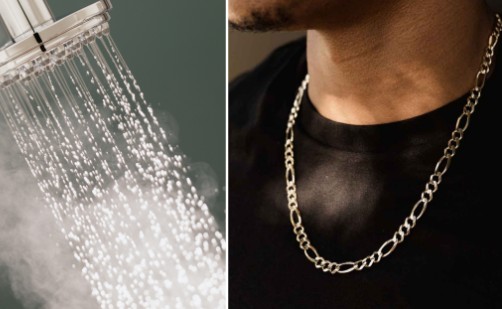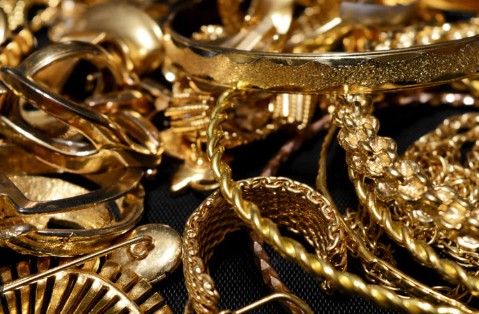Do you have that special gold jewelry you hold dearly and always wear? Gold jewelry is durable and resistant to wear and tear but has limits, so can you wear gold in the shower?
You can wear gold jewelry, such as gold rings, necklaces, or bracelets, while taking a shower without it getting damaged. This is because gold is a highly corrosion-resistant metal, which means it does not easily react with water or other substances.
However, there’s more to know about wearing gold in the shower, and this post covers these topics comprehensively. So, keep reading.

Can You Wear Gold In The Shower? (Dos and Don’ts)
When it comes to keeping your gold jewelry while showering, here are the dos and don’ts.
Dos
1. Choose High-Quality Gold Jewelry
Ensure your gold jewelry is made of a high-quality alloy, such as 14k or 18k gold, as they are more resistant to tarnishing or corrosion. The purity of gold increases with the number of karats.
24k gold is considered pure gold but is relatively soft and less suitable for everyday wear. Common options include 14k and 18k gold.
2. Dry Your Gold Jewelry After Showering
Despite being resistant, moisture can tarnish gold, so wipe your jewelry using a soft cloth. Exposure to moisture and oxygen can make gold turn yellow, black, or brown.
3. Check For Gemstone Compatibility To Moisture
If your gold jewelry contains gemstones, make sure they are also safe to expose to water. Some gemstones are more delicate or porous, and prolonged exposure to water or certain chemicals could damage them.
4. Clean Your Gold Jewelry Regularly
Over time, soap residue, body oils, and other substances can build up on your gold jewelry. Therefore, regularly clean your gold jewelry with a soft cloth and mild soapy water to keep it looking its best.
Don’ts
a) Avoid Harsh Chemicals
Although gold is resistant to corrosion, avoid exposing your gold jewelry to harsh chemicals because they can damage the metal or any gemstones present.
Chlorine, commonly found in swimming pools and household cleaning products, can weaken gold causing it to become brittle or even break. So, remove your gold jewelry before swimming or using chlorinated water.
Bleach can also corrode gold, while strong cleaning agents, such as abrasive or acidic cleaners, can harm the surface of gold and cause it to lose its luster. Moreover, the chemicals in hot tubs and hot springs can be detrimental to gold jewelry, and so are high temperatures and prolonged exposure to heat.
Some chemicals in hair products and perfume can react with gold and cause discoloration or damage over time. For this reason, apply these products before wearing your gold jewelry or ensure they have dried completely.
b) Remove Gold-Plated Or Gold-Filled Jewelry Before Taking A Shower
Take off gold-plated or gold-filled jewelry before showering. These pieces have a thin layer of gold over another base metal, and prolonged exposure to water can cause the gold layer to wear off or tarnish.
c) Be Cautious With Delicate Or Antique Pieces
Avoid showering with your delicate or antique gold pieces altogether. They may have intricate designs, be more susceptible to damage, or contain delicate gemstones.
They also hold significant value, both sentimentally and monetarily.
What Are The Risks Of Showering With Gold Jewelry?
Yes, showering with gold jewelry is safe, but doing so has risks. These include:
1) Damage To Gemstones
Gold jewelry with gemstones is more vulnerable to damage from exposure to water. Some gemstones are porous or delicate and can be adversely affected by prolonged contact with water or the chemicals in soaps and shampoos. Water can cause them to become dull, discolored, or even loosen from their settings.
2) Tarnishing Of Non-Gold Components
Gold jewelry often includes metals such as silver or copper as part of the alloy. These metals can tarnish or react with water, leading to discoloration or changes in the appearance of the jewelry.
Exposure to soap, shampoo, and other bathing products can accelerate this process.
3) Increased Risk Of Loss Or Damage
You risk losing your gold jewelry by wearing it in the shower. The combination of soap, water, and the slippery nature of your skin can make it easier for jewelry to come loose, potentially leading to loss or damage.
4) Wear And Tear
Prolonged exposure to water and the friction from bathing can contribute to general wear and tear on your gold jewelry. Repeated exposure to water and soap can affect the overall condition and appearance of the jewelry, such as dulling its shine or causing small scratches.

Can You Wear 18k Gold In The Shower?
You can wear 18k gold jewelry in the shower without it getting damaged. 18k gold is an alloy consisting of 75% pure gold and 25% other metals added to increase its durability and strength.
It is less prone to tarnishing or corrosion compared to lower-karat gold alloys. However, although showering with 18k gold jewelry is safe, only do it sometimes and avoid it, if possible, to protect it from tarnish.
Can You Wear 22k Gold In The Shower?
Wearing 22k gold jewelry in the shower is safe, as 22k gold is highly resistant to tarnishing or corrosion due to its high gold content. 22k gold consists of 91.67% pure gold and 8.33% other metals, added to improve its durability.
Can You Wear 24k Gold In The Shower?
You can wear 24k gold while showering, but it is not advisable to do so. While pure gold (24k gold) is highly resistant to tarnishing or corrosion, it is relatively soft and malleable.
However, prolonged exposure to water and soap can lead to potential damage or deformation of the jewelry. The softness of 24k gold makes it more prone to scratches, dents, or deformations from everyday wear, including exposure to water and friction during showering.
Can You Wear 9ct Gold In The Shower?
You can safely wear 9ct gold jewelry while showering. 9ct gold is an alloy comprising 37.5% pure gold and 62.5% other metals, such as copper, silver, or zinc.
This composition gives the jewelry durability and strength. However, 9ct gold, with a higher percentage of other metals, can be more prone to tarnishing compared to higher-karat gold alloys.
Therefore, prolonged water, soap, and chemical exposure can contribute to tarnishing. Fortunately, you can maintain the shine of your 9ct gold jewelry through regular cleaning with a soft cloth.
Can You Shower With 18k Gold Vermeil?
You should not shower with 18k gold vermeil jewelry. Gold vermeil consists of a base metal, such as sterling silver, coated with a thick layer of gold through electrolysis or electroplating.
The gold layer in vermeil jewelry is thicker compared to standard gold plating. However, it is still more susceptible to wear and damage from prolonged exposure to water, soap, and humidity.
Moisture can penetrate the coating, leading to tarnishing, discoloration, or even peeling. Also, chemicals in soap, shampoo, body wash, and other bathing products can react with the gold layer, causing it to wear off or lose its luster.
You can also accelerate the wearing off of the gold vermeil layer through rubbing and friction while showering.
Can You Wear Gold In The Pool?
You should not wear your gold in the pool, especially in chlorinated pools. Chlorine is a strong chemical that can react with the metals in gold jewelry, causing discoloration, damage, or weakening over time.
You also risk losing or damaging it since the combination of water, swimming movements, and slippery skin can make it easier for jewelry to slip off or get caught on something, leading to loss or damage. Additionally, small particles in pools, such as sand or debris, can cause scratches or abrasions on the gold jewelry’s surface, especially true for softer gold alloys.
Can You Wear Gold In The Ocean?
You can wear gold jewelry in the ocean, but take certain precautions to protect it. While the ocean environment poses risks, proper care and maintenance can help minimize potential damage.
Some gold jewelry designs are more suitable for ocean wear than others. For instance, pieces with secure settings, sturdy clasps, and minimal delicate details are better suited for the ocean environment.
Additionally, solid gold jewelry or gold jewelry with higher karat purity, such as 18k or 22k gold, is more resistant to corrosion and damage.
After swimming in the ocean, rinse your gold jewelry with freshwater as soon as possible, then gently pat dry with a soft cloth. This helps remove saltwater, sand, and other residues that can result in corrosion or abrasion.
Also, keep your gold jewelry away from harsh chemicals such as sunscreen, lotions, and perfumes while in the ocean. These substances can react with the gold or cause a buildup that can affect its appearance.
Moreover, avoid activities in the ocean that expose your gold jewelry to excessive force, such as surfing, diving, or rigorous water sports. Sudden impact or strong currents can increase the risk of damage or loss.

Can You Wear Gold Plated Jewelry In The Shower?
You should not wear gold-plated jewelry in the shower. Gold-plated jewelry consists of a thin gold layer applied over a base metal like brass.
The plating is relatively delicate and can wear off or tarnish with prolonged water, soap, and humidity exposure.
Prolonged exposure to water, especially hot water and steam in the shower, can cause the gold plating to deteriorate. The moisture can penetrate the plating, leading to tarnishing, discoloration, or even peeling.
In addition, chemicals in bathing products like soap and shampoo can interact with the plating and contribute to its deterioration. Furthermore, the rubbing and friction during showering can accelerate the wearing off of the gold plating, especially in areas where the jewelry touches the skin or other surfaces.
Final Remarks on Can You Wear Gold In The Shower?
You do not have to remove your gold jewelry before taking a shower. However, understand that you could lose, damage, or cause it to wear off quickly. Other metals you can wear in the shower are stainless steel, platinum, titanium, and silicone or rubber. On the other hand, don’t wear silver, copper, brass, porous gemstones, soft gemstones, wood, or leather in the shower.
Also, read:
